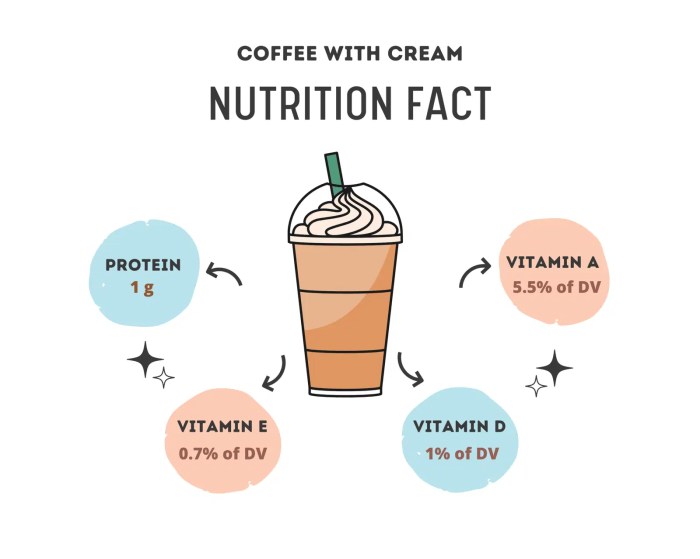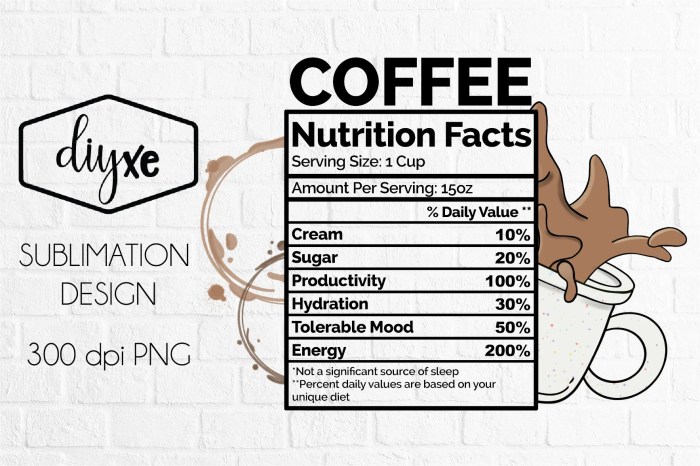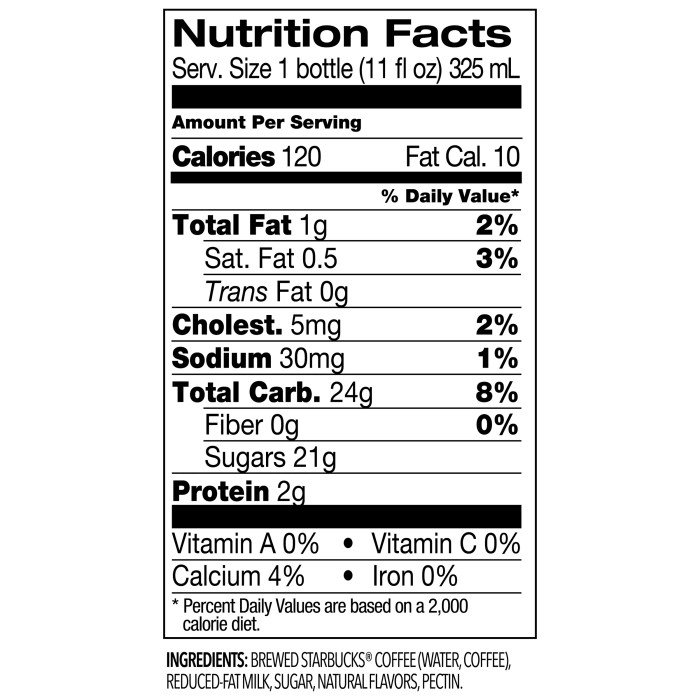Nutritional Content of Black Coffee (8 oz)

Nutrition facts for 8 oz coffee – A common morning ritual for millions, coffee offers more than just a caffeine kick. Understanding its nutritional profile, particularly in its simplest form – black coffee – reveals a surprisingly nuanced picture beyond the familiar stimulant effects. While not a significant source of calories or macronutrients, black coffee contributes a small but notable amount of certain micronutrients. Let’s delve into the details of an 8-ounce serving.
Macronutrient Composition of Black Coffee, Nutrition facts for 8 oz coffee
Black coffee, devoid of added cream, sugar, or other ingredients, is remarkably low in calories and macronutrients. The primary contributor to its negligible caloric content is the trace amount of carbohydrates present naturally in the coffee beans. Protein and fat content are practically insignificant. This makes black coffee a popular choice for those seeking a low-calorie beverage.
| Nutrient | Amount | Unit of Measurement |
|---|---|---|
| Calories | 2-5 | kcal |
| Carbohydrates | 0-1 | g |
| Protein | 0-1 | g |
| Fat | 0 | g |
Micronutrient Profile of Black Coffee
Despite its low macronutrient content, coffee beans are a surprisingly rich source of various micronutrients. These bioactive compounds, although present in small quantities in a single 8-ounce serving, contribute to the overall health benefits associated with moderate coffee consumption. These micronutrients are largely retained during the brewing process, making black coffee a relatively good source.
An 8-ounce cup of black coffee contains minimal calories and nutrients, primarily offering caffeine. Comparing this to the substantial caloric and carbohydrate content found in other breakfast choices, such as reviewing the einstein bagels nutrition facts , highlights the significant nutritional differences between beverage and food choices. Understanding these differences is crucial for managing daily caloric intake and overall nutritional balance.
| Nutrient | Amount (per 8 oz) | Unit of Measurement |
|---|---|---|
| Potassium | 2-5 | mg |
| Magnesium | 1-3 | mg |
| Pantothenic Acid (Vitamin B5) | 0.1-0.2 | mg |
| Riboflavin (Vitamin B2) | Trace amounts | mg |
| Niacin (Vitamin B3) | Trace amounts | mg |
Note: The amounts of micronutrients can vary significantly depending on factors such as coffee bean type, roasting method, and brewing technique. These values represent approximate ranges based on average data from various studies. The “trace amounts” indicate levels too small to be reliably quantified in standard nutritional analyses for a single 8-ounce serving.
Impact of Additives on Nutritional Value

Adding ingredients to coffee significantly alters its nutritional profile, transforming a relatively low-calorie beverage into a potentially high-calorie treat depending on the choices made. Understanding these changes is crucial for maintaining a balanced diet. The impact extends beyond simple calorie counts, affecting carbohydrate intake, fat content, and the overall nutritional value.
Sugar’s Impact on Caloric and Carbohydrate Content
The addition of sugar dramatically increases the caloric and carbohydrate content of coffee. One teaspoon of granulated sugar contains approximately 4 grams of carbohydrates and 16 calories. This seemingly small amount can quickly add up. For an 8-ounce cup of coffee:
- 1 teaspoon of sugar adds approximately 16 calories and 4 grams of carbohydrates.
- 2 teaspoons of sugar adds approximately 32 calories and 8 grams of carbohydrates.
- 3 teaspoons of sugar adds approximately 48 calories and 12 grams of carbohydrates.
These figures illustrate how quickly a seemingly simple addition can significantly increase the overall caloric and carbohydrate load of your beverage. Consider that many commercially available flavored coffee syrups contain considerably more sugar than this, further amplifying the impact.
Nutritional Comparison of Coffee with Different Milk Types
The choice of milk significantly impacts the nutritional content of your coffee. The following table compares the nutritional profiles of 8 ounces of coffee with various milk additions (assuming 1/2 cup of milk added):
| Milk Type | Calories (approx.) | Fat (g) (approx.) | Protein (g) (approx.) | Carbohydrates (g) (approx.) |
|---|---|---|---|---|
| Whole Milk | 80-100 | 5-8 | 4-6 | 6-10 |
| Skim Milk | 40-50 | 0-1 | 4-6 | 10-12 |
| Almond Milk (unsweetened) | 15-30 | 1-3 | 1-2 | 1-3 |
| Soy Milk (unsweetened) | 30-40 | 1-4 | 4-7 | 2-4 |
Note: These values are approximate and can vary based on the specific brand and type of milk.
Effects of Cream, Flavored Syrups, and Whipped Cream
Cream, flavored syrups, and whipped cream substantially increase the calorie, fat, and sugar content of coffee. Heavy cream, for example, is high in saturated fat and calories. Flavored syrups are often loaded with added sugars, and whipped cream contributes significant calories and fat. A single pump of flavored syrup can add 50-100 calories and several grams of sugar.
A dollop of whipped cream can easily add another 50-100 calories and significant amounts of fat. The cumulative effect of these additions can result in a coffee drink with hundreds of extra calories compared to a simple black coffee.
Consuming these heavily sweetened and high-fat additions regularly can contribute to weight gain and other health concerns.
Serving Size Considerations: Nutrition Facts For 8 Oz Coffee

The nutritional content of coffee, while generally low in most components, is directly proportional to the volume consumed. Understanding how serving size impacts the overall nutritional intake is crucial for accurate assessment of coffee’s role in a balanced diet. This section will explore how altering the serving size and brewing method affects the concentration of various nutrients.
Nutritional values are typically presented per serving, often an 8-ounce cup. However, many coffee drinkers consume larger servings, such as 12 or 16 ounces. Let’s consider a hypothetical example: if an 8-ounce cup of black coffee contains 2 calories, 0 grams of fat, and negligible amounts of other nutrients, a 12-ounce cup would contain approximately 3 calories (2 calories/8 oz
– 12 oz = 3 calories), maintaining the same negligible amounts of other nutrients.
Similarly, a 16-ounce cup would contain roughly 4 calories. It’s important to remember these are estimates, as slight variations can occur depending on bean type, roast, and brewing method. However, the principle of proportionality remains consistent.
Nutrient Concentration and Brew Method
Different brewing methods extract varying amounts of compounds from coffee beans. This affects the concentration of nutrients, though the overall nutritional impact remains relatively low. For example, French press coffee generally contains higher concentrations of caffeine and certain oils compared to drip coffee due to the longer brewing time and finer filtration. Espresso, due to its high concentration, will have a proportionally higher amount of all components per ounce compared to drip or French press coffee, though still within the range of low nutritional impact.
While these differences are present, they do not significantly alter the overall nutritional profile of coffee, which remains low in calories and most nutrients regardless of brewing method.
Serving Size and Nutritional Impact
Considering serving size is essential for a comprehensive understanding of coffee’s contribution to daily nutritional intake. While a single 8-ounce cup provides minimal calories and nutrients, consuming multiple large servings throughout the day can accumulate a noticeable caloric intake, especially when considering added ingredients like milk, sugar, or syrups. For example, adding 2 tablespoons of sugar to a 16-ounce coffee significantly increases the caloric and carbohydrate content.
Therefore, monitoring both serving size and the addition of caloric ingredients is critical for assessing the overall nutritional impact of coffee consumption. A mindful approach to serving size ensures that coffee remains a part of a balanced diet without negatively impacting overall nutritional goals.
Popular Questions
Is decaf coffee healthier than regular coffee?
The nutritional differences between regular and decaf coffee are minimal. The decaffeination process may slightly alter some micronutrient levels, but the overall impact on health is negligible. The main difference lies in the caffeine content.
Does cold brew coffee have different nutritional values?
The nutritional content of cold brew coffee is similar to that of hot-brewed coffee. The brewing method doesn’t significantly alter the macronutrient or micronutrient profile, although the caffeine concentration might vary slightly depending on the brewing time and coffee-to-water ratio.
Can coffee interfere with medication?
Yes, caffeine can interact with certain medications. It’s crucial to consult a doctor or pharmacist if you are taking any medications, particularly those affecting the heart or nervous system, to determine potential interactions with coffee consumption.
How much coffee is considered “moderate” consumption?
Moderate coffee consumption is generally considered to be up to 400mg of caffeine per day for most adults. This translates to roughly 3-5 cups of brewed coffee, but it can vary depending on the strength of the brew and individual sensitivity to caffeine.
